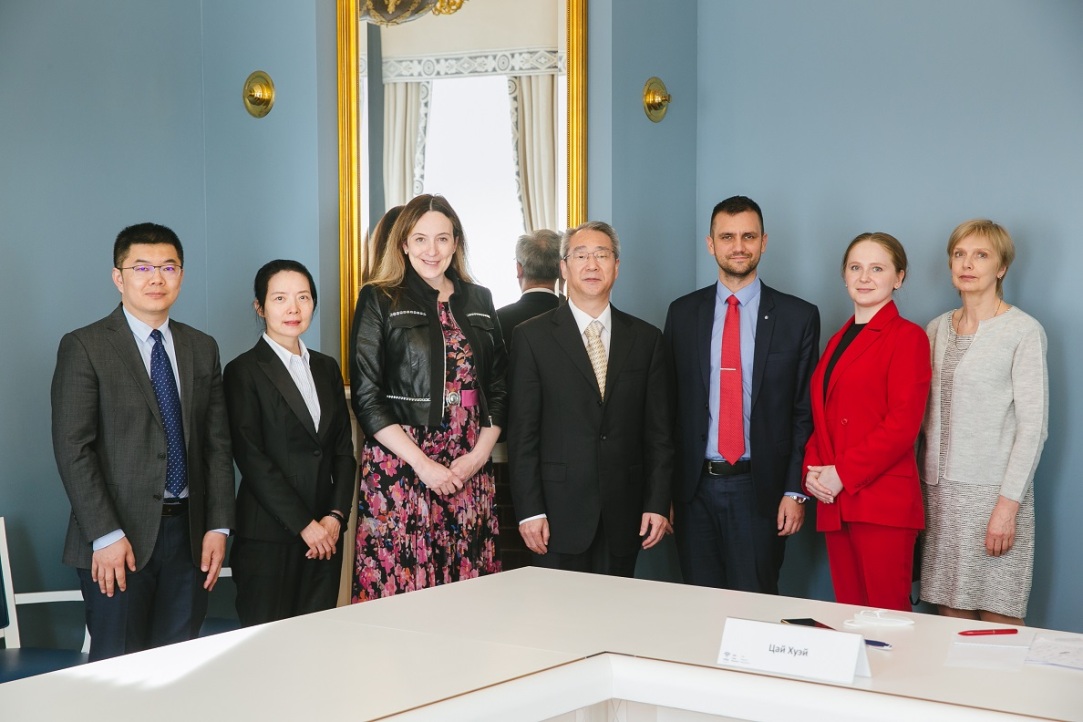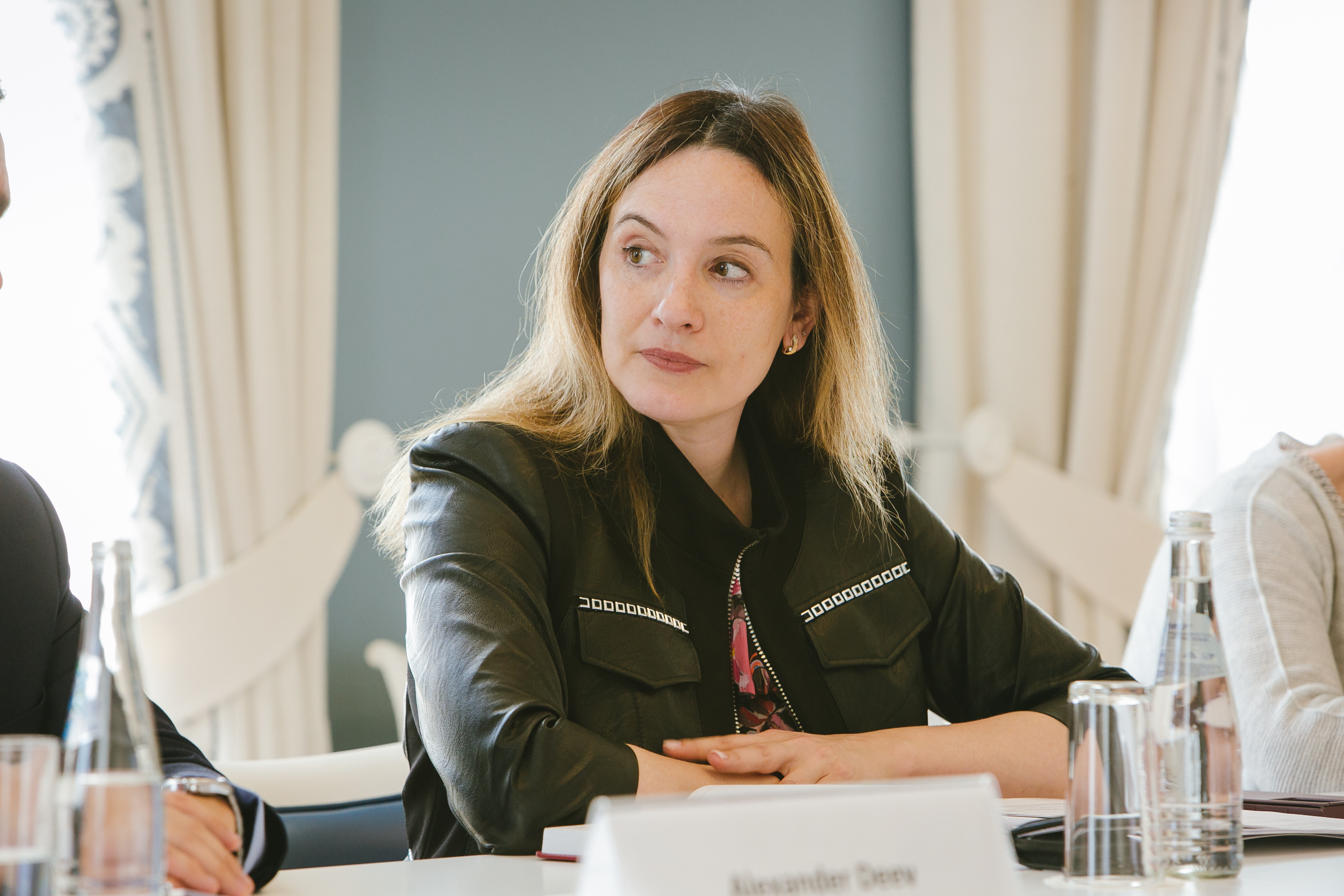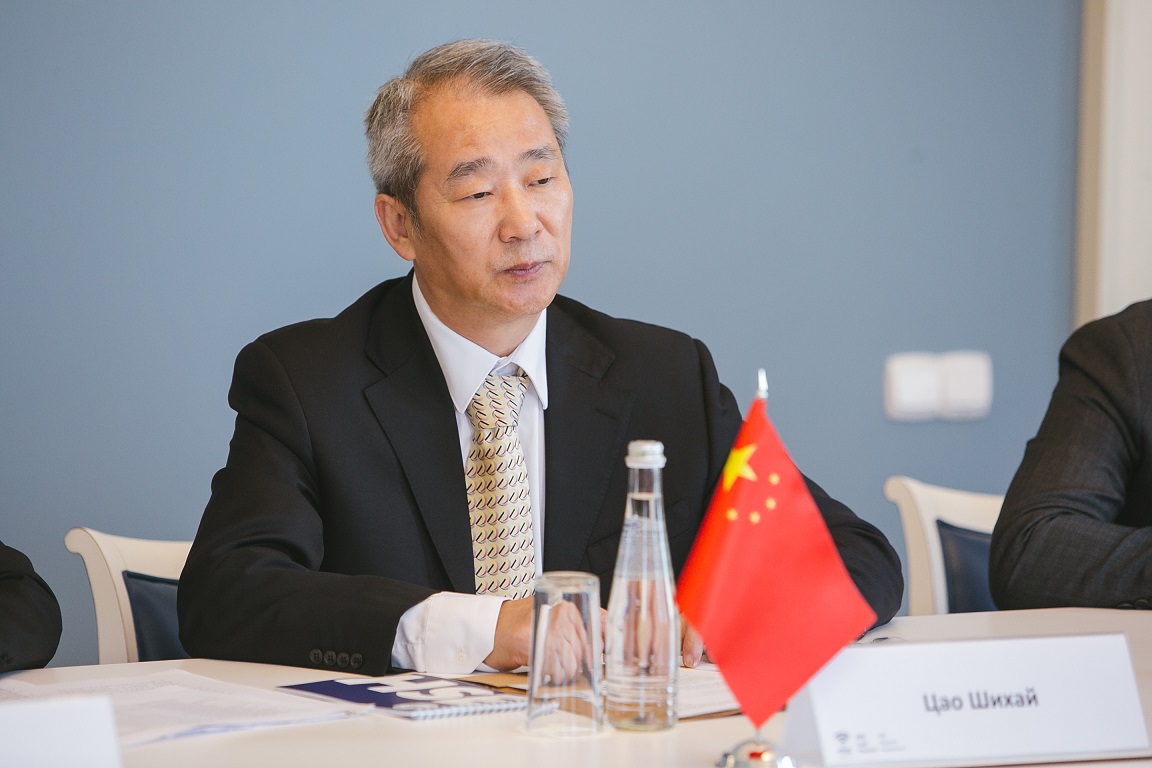HSE University Expands Cooperation with China

HSE University plans to significantly expand its cooperation with Chinese universities and schools, creating new cooperation programmes and developing existing ones. This includes plans to attract potential candidates to take part in HSE University olympiads, increase the number of Chinese students at the university, and create joint educational programmes.
A meeting between the university administration and a delegation of the Chinese embassy in Russia took place in the Pokrovka building at HSE University-Moscow. Opening the meeting, HSE University Vice Rector Victoria Panova noted the importance of establishing ties between universities and research institutes in the two countries. She stressed that HSE is one of the leading universities in Russia: in recent years, it has managed to increase its representation in international subject rankings to almost 50. HSE actively cooperates with Chinese universities, having signed 35 agreements with 23 universities, including Peking University, Tsinghua University, and the Harbin Institute of Technology. The university has 13 joint projects in fundamental research with Chinese institutions, and 214 Chinese students study at HSE.

Despite all of this, Victoria Panova is confident that there is further potential for cooperation between HSE and Chinese universities. ‘We are open to discussing options for expanding cooperation and deepening ties between educational and research institutions in our two countries,’ summarised the vice rector.
Cao Shihai, Minister Counsellor and Head of the Department of Educational Affairs of the Embassy of the People's Republic of China to the Russian Federation, expressed his gratitude to HSE University for providing assistance to Chinese students during the pandemic and noted that the university is popular in China. The diplomat emphasised that China pays special attention to cooperation in the field of education. According to the minister counsellor, more than 3,000 agreements have been signed between the two countries and 13 Russian-Chinese university associations have been created. In recent years, 116 joint educational institutions and projects have been organised.

Cao Shihai said that HSE is a young university that has achieved great results. ‘We will be very happy to facilitate cooperation between HSE University and Chinese partners,’ he said.
He also noted the growth in mutual interest in language studies. Around 120,000 school and university students in China study Russian, while roughly 113,000 Russian students study Chinese. Cao Shihai highlighted the ongoing expansion of Chinese-language teaching at HSE University and expressed his willingness to expand cooperation in studies of the language.
Victoria Panova stressed the importance of expanding joint programmes with leading Chinese universities such as Peking University and Tsinghua University.
HSE University is interested in joint master’s programmes in socioeconomics, the humanities, and the natural sciences. Victoria Panova told the Chinese delegation about the university’s global leadership in a range of fields: the HSE University programming team consistently wins prize places in international olympiads, while HSE MIEM trains outstanding engineers, mathematicians, and electronics specialists. The university also has strong biology, neurobiology, cognitive and neuroscience, geography, and physics faculties.
The vice rector also proposed an initiative to prepare joint Russian-Chinese research periodicals.
Victoria Panova highlighted HSE University’s readiness to develop the teaching of Russian language in Chinese universities, facilitating academic exchanges with universities with strong Russian-language departments, and offering assistance to universities that would like to improve their Russian-language competencies. She also proposed inviting teachers from China to teach Chinese.
Another likely area of cooperation between HSE and Chinese universities is the MBA course. Victoria Panova noted that the course can be taken in both Chinese and English.
The vice rector also invited Chinese students to take part in university’s annual summer schools. In light of this, it is important that information about the university is widely disseminated in China. ‘This would be good and useful for both parties. We are happy to admit Chinese school students to study at our university,’ she said. She also proposed holding joint Russian-language olympiads in China in order to objectively assess the knowledge of Chinese school students.
Victoria Panova highlighted that Chinese social media is an important element of communicating with students and applicants—one which could replace Western equivalents in this turbulent period. Alexander Deev, Director of International Admissions at HSE University, added that the embassy’s help is vital in promoting HSE’s social media pages and making them better known to potential applicants.
According to Cao Shihai, the education of doctoral students at Russian universities is a priority area for China. He proposed expanding the education of Chinese doctoral students at HSE University in various subjects and appealing to more Chinese students and candidates to take part in the university’s olympiads. ‘We should maintain ties in order to learn about such events in time and tell Chinese students about them,’ he said. He also supported the idea of launching joint Russian-Chinese research publications.
‘We hope that prestigious and strong fields for Chinese students will be more open at Russian universities, and likewise for Russian students in China. This will allow us to jointly train sought-after, highly qualified specialists in various fields of science and research,’ he explained.
The Chinese diplomats thanked HSE University for the initiatives proposed and suggested a joint cooperation project of their own: organising summer camps in Russia and China for students from each other’s countries.
The parties also discussed the idea of conducting a joint conference between HSE and leading Chinese universities on priority scientific areas. Victoria Panova believes that this will help to find new areas of cooperation and contact, as well as organise new bilateral projects.
After the meeting, the Chinese delegation was given a tour of one of the buildings of the HSE University campus on Pokrovsky Bulvar: the Durasov House, which is a cultural heritage site.
Alexander Deev
See also:
HSE University Strengthens Ties with Peking University
On July 21, 2025, representatives from Peking University led by Zhang Jin, Vice President of Peking University and Chancellor of Shenzhen Graduate School, paid a visit to HSE University. The delegation included forty students, teachers, and administrators. During their visit, leaders from both universities discussed potential areas for future collaboration, and representatives from three HSE University departments held meetings with Chinese students.
HSE University Brings Together Researchers at International AI Summer Institute in Shanghai
In early July 2025, the International Summer Institute on Artificial Intelligence in Education took place in Shanghai. It was organised by the HSE Institute of Education in cooperation with East China Normal University (ECNU). More than 50 early-career researchers and keynote speakers from nine countries—ranging from Russia and China to Canada and Singapore—gathered to share the latest findings from their work and to forge new international partnerships.
‘I Will Always Carry Gratitude to HSE and Move Forward for My Dream’
Fan Minlan, a 25-year-old from the coastal city of Zhangzhou in southeastern China, has recently graduated from the HSE Master’s Programme in Population and Development. In her interview with the HSE News Service, Fan Minlan speaks about her decision to enrol at HSE University, the challenges of speaking Russian, her career plans, and the love story that started with her studies.
FES Explores Collaboration Opportunities with Shanghai University
On June 27, 2025, the Faculty of Economic Sciences at HSE University hosted a delegation from the School of Economics at Shanghai University, a partner of the Faculty of Economic Sciences and the International College of Economics and Finance. The main goal of the meeting was to discuss the prospects for expanding cooperation between the partners, specifically the development of academic exchange and the organisation of joint events for students and faculty from both the School of Economics and the Faculty of Economic Sciences.
Building Bridges: Russian–Chinese Summer School on International Relations Opens
The XII Russian-Chinese Summer School on International Relations has opened at HSE University. This year’s theme is ‘Facets of the World Majority: Practice and Narratives.’ The school has brought together 27 master's and doctoral students as well as early-career researchers from leading universities in China and Russia.
Roundtable on Russia–China Cooperation in Antimonopoly Policy Held at HSE University
HSE University hosted a roundtable titled ‘New Challenges for Antitrust Regulation: The Chinese Perspective.’ The event was organised by the International BRICS Competition Law and Policy Centre (BRICS Centre). Special guests included Chinese colleagues from the Competition Policy and Assessment Centre (CPAC) of the State Administration for Market Regulation of the People’s Republic of China (SAMR). Last year, the BRICS Centre and CPAC SAMR signed an agreement on strategic cooperation.
HSE and Sichuan University Sign Cooperation Agreement
On May 20, 2025, HSE University hosted an official delegation from Sichuan University headed by President Wang Jinsong. During the meeting, the universities signed a cooperation agreement.
HSE GSB MBA in Shanghai: Chinese Experience for Russian Executives
The HSE Graduate School of Business has held an international module of its MBA programme in Shanghai. The module gathered 94 participants—top managers of major Russian companies, entrepreneurs, and executives from state-owned enterprises.
HSE and Tsinghua University Strengthen Russia–China Partnership as part of Cross Year of Education
On May 10, a delegation from Tsinghua University—one of China’s leading higher education institutions—paid an official visit to HSE University. The delegation was led by Qiu Yong, Secretary of the CPC Tsinghua University Committee, former President and Chair of the University Council, and member of the Chinese Academy of Sciences.
HSE University Signs Cooperation Agreements with Leading Chinese Universities
On May 8, 2025, in Moscow, in the presence of Russian President Vladimir Putin and Chinese President Xi Jinping, strategic agreements were signed between the HSE University and two of China's top institutions, Peking University and Tsinghua University. The event was attended by Nikita Anisimov, Rector of HSE University, Qiu Yong, Secretary of the CPC Tsinghua University Committee, and Gong Qihuang, President of Peking University. The signing unfolded during the official visit of the Chinese delegation to Russia, coinciding with the commemoration of the 80th Anniversary of Victory Day.


